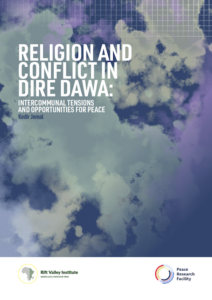SUMMARY
• Dire Dawa, Ethiopia’s second largest city, is a multi-ethnic and multi-religious economic hub in the country’s eastern region, sitting on the contested boundary between the Oromia and Somali regions. Despite an overarching sense that the city’s historical norm is one of inter-religious and inter-ethnic conviviality, Dire Dawa has since 2018 been afflicted by successive waves of inter-communal violence.
• While the initial round of conflicts in the city could be read as purely ethnic clashes, external and internal factors have since drawn religious identity into the fray. Interreligious clashes elsewhere and the perception of rising religious tension among the youth have contributed to expectations of inter-religious conflict.
• Even so, the predominant factor underlying the conflicts seems to be a local one. When the central ethnic controversy evolved from an intra-Muslim (Oromo vs. Somali) rivalry into a Christian–Muslim one (Amhara vs. Oromo/Somali), it acquired a religious dimension. Given the territorial nature of these disputes, it is unsurprising that Orthodox Ṭəmqät processions through predominantly Muslim areas became the major flashpoint.
• Despite a generalized perception of rising inter-religious conflict and extremism, there is little evidence of this in Dire Dawa itself, with not a single participant denying the right of any religion to exist and flourish in the city. Moreover, there is a widespread view that the recent clashes have not fundamentally altered the prospects of interreligious peace.
• This leaves considerable room for peacebuilding work. Religious actors have an important role to play in calming inter-ethnic and inter-religious tensions, despite some criticism of religious leaders becoming politically co-opted or working for their own benefit. More institutionalized forms of inter-religious dialogue, such as the Inter-Religious Council, also hold the potential to build peace across communities, although the council itself has now become a site of contestation, with the Muslim side pushing for greater representation.
• Overall, the politics of ethnicity and religion are subject to a range of contextual factors, including economic pressures, youth unemployment, competition over land, and ethnic and religious homogenization of suburban settlements. This provides significant scope for administrative intervention beyond direct dialogue and peacebuilding. Creating more economic opportunities, setting up transparent processes for land allocation, and developing zoning plans that promote ethnic and religious pluralization in each of the city’s suburbs would go a long way in preventing further conflict.
This report was written for the Ethiopia Peace Research Facility (PRF). The PRF is an independent facility combining timely analysis on peace and conflict from Ethiopian experts with support for conflict-sensitive programming in the country. It is managed by the Rift Valley Institute and funded by the UK government.
Find the Amharic version of the report summary here.




